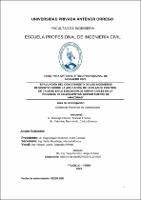Evaluación del conocimiento de los ingenieros residentes sobre la aplicación de un plan de control de calidad en la ejecución de obras civiles en la provincia de Chachapoyas, departamento de Amazonas

Ver/
Descargar
(application/pdf: 160.2Kb)
(application/pdf: 160.2Kb)
Fecha
2022Autor(es)
Durango Chávez, Manuel Enrique
Palomino Reymundo, Carlos Ernesto
Metadatos
Mostrar el registro completo del ítemResumen
La presente investigación tiene como título: “EVALUACIÓN DEL
CONOCIMIENTO DE LOS INGENIEROS RESIDENTES SOBRE LA APLICACIÓN
DE UN PLAN DE CONTROL DE CALIDAD EN LA EJECUCIÓN DE OBRAS
CIVILES EN LA PROVINCIA DE CHACHAPOYAS, DEPARTAMENTO DE
AMAZONAS” elaborada para obtener Título Profesional de Ingeniero Civil. Esta
investigación tiene como objetivo principal saber el nivel de conocimiento que
poseen los Ingenieros Residentes sobre la aplicación de un plan control de calidad
en obras civiles de la provincia de Chachapoyas, departamento de Amazonas.
Por lo inicialmente identificamos 15 obras civiles que se estén ejecutando en
la provincia de Chachapoyas, para poder entrevistar a los Ingenieros Residentes
que laboran en cada una de las obras civiles. Luego aplicamos las encuestas para
identificar el nivel de conocimiento que poseen los Ingenieros Residentes sobre la
aplicación de plan control de calidad en obras civiles de la provincia de
Chachapoyas. Estas encuestas están divididas en dos partes, la primera parte es
para conocer datos generales de la obra y del Ingeniero Residentes, alguno de
estos datos son el nombre, edad, experiencia como Residente de Obra y su
especialización y la segunda parte de la encuesta es para identificar el nivel de
conocimiento que tienen los Ingenieros Residentes sobre la conceptualización de
términos sobre el control de calidad en Obra de Construcción.
Para medir el nivel de conocimiento de los ingenieros residentes se utilizó la
tabla N° 28 donde se especifica los parámetros de evaluación: De 0% a 40% es un
nivel de conocimiento bajo, de 41% a 60% es un nivel de conocimiento regular y de
61% a 100% es un nivel de conocimiento óptimo. Empleamos el programa Microsoft
Excel para el procesamiento estadístico de los datos recolectados. Finalmente,
como resultado tuvimos un mínimo porcentaje con el nivel de conocimiento óptimo
de un 07% del total de entrevistados, con un nivel de conocimiento regular tenemos
un 20% del total de entrevistados y finalmente el mayor porcentaje un nivel de
conocimiento bajo con un 73% del total de entrevistados. The title of this research is: ““EVALUATION OF THE KNOWLEDGE OF RESIDENT
ENGINEERS ON THE APPLICATION OF A QUALITY CONTROL PLAN IN THE
EXECUTION OF CIVIL WORKS IN THE PROVINCE OF CHACHAPOYAS,
AMAZONAS DEPARTMENT““ prepared to obtain the Professional Title of Civil
Engineer. The main objective of this research is to know the level of knowledge that
Resident Engineers have about the application of a quality control plan in civil works
in the province of Chachapoyas, department of Amazonas.
Therefore, we initially identified 15 civil works that are being executed in the province
of Chachapoyas, in order to interview the Resident Engineers who work in each of
the civil works. Then we apply the surveys to identify the level of knowledge that
Resident Engineers have about the application of the quality control plan in civil
works in the province of Chachapoyas. These surveys are divided into two parts,
the first part is to know general data of the work and the Resident Engineer, some
of these data are the name, age, experience as a Work Resident and their
specialization and the second part of the survey is to identify the level of knowledge
that Resident Engineers have on the conceptualization of terms on quality control in
Construction Work.
To measure the level of knowledge of the resident engineers, table N ° 28 was used
where the evaluation parameters are specified: From 0% to 40% is a low level of
knowledge, from 41% to 60% is a regular level of knowledge and 61% to 100% is
an optimal level of knowledge. We use the Microsoft Excel program for the statistical
processing of the collected data. Finally, as a result, we had a minimum percentage
with the optimal level of knowledge of 07% of the total interviewees, with a regular
level of knowledge we have 20% of the total interviewees and finally the highest
percentage a low level of knowledge with 73 % of the total interviewees.
Colecciones
- Ingeniería Civil [1361]

